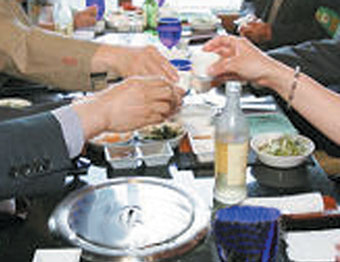The Korean Drinking Culture Through International Eyes

Q1) What is the general attitude towards drinking in your country?
Jeong: It's not as bad as Korea, but I can't say it's good. When people go out to party, they'll mostly drink to get drunk. But on the other hand, we can go out to a bar for just a couple of beers or cocktails. In general, drinking doesn't become much of an issue.
Song: In Russia, alcohol is a part of everyday life. It basically accompanies all events. You drink to make friends; you drink both to celebrate and to mourn.
Q2) Is there any peer pressure to drink in your country?
Cho: You don;t get the "senior-junior" type peer-pressure, but you might feel awkward when not drinking around drinkers. There is indirect pressure, but no force.
Shibata: I've heard of cases when the older drinker pressures the younger to drink, but overall Japanese students have a choice to drink or not to drink for themselves.
Song: It's a free choice. People might offer drinks a couple more times after someone rejects it, but once that person clearly states why they don't want to drink, that choice is respected.
Jeong: The only pressure is to drink and have a good time together. Your choice won't affect your job or status.
Q3) Do you think some drinking codes could change/improve in your country?
Jeong: Looking at it from a Korean perspective, I don't see much else that they can improve. It's excellent compared to Korea.
Song: The drinking culture is not that bad, but sometimes the drinking can get a little excessive.
Shibata: The age limit could be raised to prevent excessive drinking among young people. And I think people should be responsible for themselves. Some people just don't know their limits!
Q4) When compared with your country, what do you think of the drinking culture in Korea?
Cho: It's similar in a sense that it's easy to become socially marginalized if you don't drink in both places. However, the type of pressure is different. Not drinking in the U.S. means that you won't get too friendly with the social drinkers, unlike Korea, where they could enforce drinking as an act of unity within a group.
Song: Since the "junior-senior" relationship is important in Korea, if you reject an offer you could be marked as extremely rude, a cultural aspect which I hope will eventually disappear.
Shibata: As for me, since there is no habit of doing "one-shots" in Japan, experiencing that in Korea was very surprising. I've also heard that you have to drink when an older student asks you, I understand that Korean people have to respect what older people say but I think it would be hard for those who can't drink much. Overall, I think Korean people enjoy alcohol and I like the atmosphere created by alcohol.
Jeong: I restricted myself to a couple of shots when my fellow boot camp trainees went out one night. Although it didn't ruin my reputation, they never called me out again. Though not completely against drinking, I'm very careful with whom I drink, and since it does have negative connotations in Korea, I've decided to be extra cautious.
These answers actually only reiterate the drinking culture Koreans are already accustomed to. Perhaps these drinking habits tell more about the rest of our culture and society than meets the eye.

